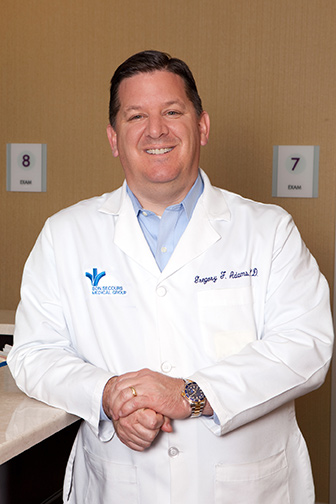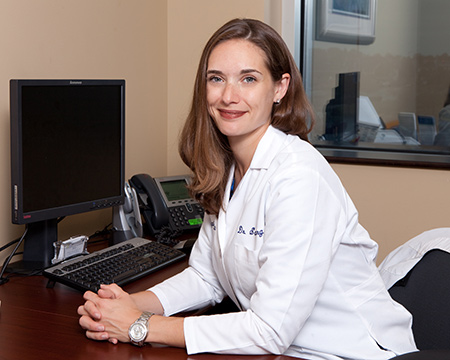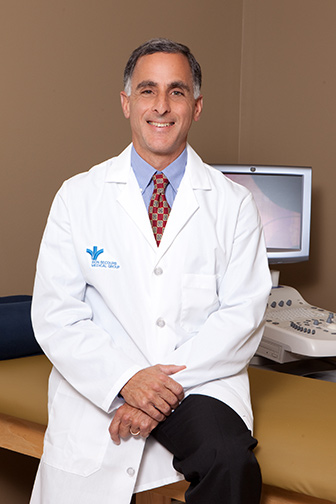Offering Hope For Individuals Suffering From the Health Effects of Morbid Obesity
It’s currently estimated that greater than 60 percent of Americans are significantly overweight, and that more than 16 million are 100 pounds or more over their ideal weight. It is well established in both the medical and the lay community that even mild obesity is associated with a host of medical conditions, including high blood pressure, heart disease, high cholesterol, diabetes, respiratory problems, sleep apnea and reflux. But unchecked obesity can also lead to urinary stress incontinence, degenerative arthritis, venous stasis disease/ulcers, several different cancers (including breast, uterine, ovarian, esophageal, colon, prostate and pancreatic), skin infections and infertility. And for the morbidly obese, the sequelae are greater still.

The surgical weight loss division of Bon Secours Surgical Specialists, led by four innovative and world-class surgeons, treats the whole person with a comprehensive plan tailored to the individual. This includes psychological, nutritional, and physical evaluations, as well as counseling, support groups and long-term coordination of care – in addition to weight loss surgery.
Commonly known as bariatric surgery, these procedures alter portions of the stomach, and in some cases, the small intestine. As a result, less food is consumed and fewer calories are absorbed. Bariatric surgery is generally considered an option for persons who have a BMI above 40. It’s also an option for people with a BMI of 35 to 40 who are experiencing potentially devastating health problems, such as Type 2 diabetes, high blood pressure or sleep apnea.
Today’s bariatric procedures are vastly different from the ineffectual and sometimes dangerous operations offered in the early days of weight loss surgery. Laparoscopic, less invasive techniques have rendered today’s procedures safer, faster and more successful.
Bariatric surgeons with Bon Secours Surgical Specialists offer three different procedures.
Gastric Bypass
In a Roux-en-Y gastric bypass, the stomach is made smaller by creating a small pouch at the top, using surgical staples or a plastic band.The smaller stomach is connected directly to the middle portion of the small intestine, bypassing the rest of the stomach and the upper portion of the small intestine. The restrictive pouch along with the removal of the portion of the stomach that impacts the release of ghrelin (a hormone that stimulates hunger) makes patients feel less hungry. The rewiring of the small intestine helps with slight malabsorption. Loss of more than 100 pounds within the first three months is not uncommon.
Sleeve Gastrectomy
In this procedure, a thin vertical sleeve of stomach (about the size of a banana) is created using a stapling device. The rest of the stomach is removed. A sleeve gastrectomy limits the amount of food that can be eaten at one time, so patients feel full sooner and stay full longer. As they eat less food, their bodies stop storing excess calories and start using their fat supply for energy, resulting in weight loss.
Gastric Band
This surgery reduces the amount of food the stomach can hold at one time by placing a silicone band around the upper portion of the stomach. The band is then connected by thin tubing to an access port just beneath the surface of the skin, which allows the surgeon to adjust the fit of the gastric band by inflating or deflating its inner lining. Most patients experience an average weight loss of one to two pounds per week until their goal weight is met.
These procedures in the hands of experienced and skilled surgeons are remarkably safe. Patients quickly learn that surgery is just a tool, and their surgeon is only one member of an impeccably trained and dedicated team that can help them lead a long, healthy and satisfying life. The team consists of professional and compassionate experts in nutrition, psychology and exercise physiology.
The members of this team know well the challenges that face people with extraordinary amounts of weight to lose. They understand the obstacles their patients must overcome on a daily basis. And they are keenly aware of the need for ongoing support. Serious weight loss is a lifetime commitment and as the surgeons note, they never really discharge a patient.
Meet our board-certified bariatric surgeons.

Gregory Adams, MD, FACS, began doing bariatric surgery more than a decade ago, in response to a community need. In the small Alabama town where he practiced, there were no surgeons performing weight loss procedures. “The nearest surgeon was a couple of towns over,” Dr. Adams remembers. “He was a one-man practice, and he was probably doing 600 surgeries a year. His procedures were good, but bariatric surgery needs the long term care of the surgeon involved, and he wasn’t offering that.” Without long term surgical care and the ongoing support of nutritionists and counselors, these patients were failing badly, and began showing up in Dr. Adams’ office seeking help. He and his partner obtained the training and expertise they needed, and established a program that met all of their weight loss patients’ needs.
Dr. Adams describes caring for weight loss patients as one of the more satisfying parts of his career. “Physicians who go into surgery usually do so because they like to fix problems,” he says. “I’m very much in that group. Patients come to me with a bad gallbladder or appendix, I take it out and they go on their way. And that’s very satisfying.”
But, like his partners, Dr. Adams enjoys his bariatric patients because of the long term relationships he establishes with them. “I get to really know people for a change, and that’s great because I get to see them actually getting healthier. I enjoy the interaction.”
The conversations can be challenging: Dr. Adams has to help patients face some hard truths. “It’s not politically correct to call obesity a disease of addiction, and it isn’t 100 percent addiction,” he says, “but the behavioral issues related to obesity do have addictive tendencies. Within a few days of starting any diet, most people can quantify the foods they really want that they had forbidden themselves. That behavior is strong, those psychological desires are real and the only way you decide to conquer those behaviors is when you can’t stand your life with them any longer. The patients who do the best are the ones who admit, ‘I cannot live like this. I need help.’”
But he cautions them. “Patients can have the misconception that weight loss surgery is a magic trick, that they can continue to live the way they’ve always lived,” he says. “I have to explain that in reality, that’s not true; it’s just a tool that makes it so they can live the way they need to. We’re asking people to literally change the way they eat, exercise, drink – those are very personal things and can be difficult.”
Changing those behaviors reaps tremendous health benefits for patients. Their diabetes is real, Dr. Adams assures them. Their sleep apnea is directly related to obesity, as is high blood pressure, high cholesterol and as many as nine different cancers. Their joint pain is real because the excess weight has compromised their joints.
Surgery changes patients’ set points so they can lose weight and keep it off, Dr. Adams notes. “At the physiological level, there are all kind of interactions, everything from hormones to actual absorption of nutrients,” he says. “In one way, it’s a metabolic tool, and in another, it helps reinforce the behaviors we’re asking patients to change. But it’s still just a tool. To succeed, they need that follow-up care and support that we offer.”

In her work with Bon Secours Surgical Specialists, Elizabeth Salzberg, MD, FACS, puts her undergraduate degree in psychology to good use. “I’ve always had a fascination with the human mind and behavior,” she says, “and I love all aspects of surgery, so treating weight loss patients allows me to marry together all of my interests.”
Although she still performs and enjoys the whole spectrum of general surgery, she estimates bariatric surgery constitutes about 70 percent of her practice. She calls bariatric surgery her passion and explains how and why she came to feel so strongly: “After I’d spent about five years in general surgery, I did a fellowship in advanced laparoscopy. I was able to really delve into bariatric surgery, and I felt an immediate connection. I’ve always had a keen interest in women’s health and nutrition, so it felt like a good fit. Today, 90 percent of my patients are women.
“Women in particular, every one of us, tend to have some struggle with weight,” she says. “We’re always seeking that work-life balance: finding time to exercise, eat properly, maintain a career and a home. I found a niche in caring for these women; not only is the surgery itself fascinating and technically challenging – and the biochemistry that goes into it – but I found I also really enjoyed the counseling.”
Part of her counseling is aimed at determining the best procedure for each individual patient. “It has a lot to do with their diet history as well as their medical history,” she explains. “There are certain operations that work better for some patients than others. It’s a complex decision. And I counsel them so they understand that surgery isn’t a magic wand. Their problems aren’t solved when they wake up from anesthesia; their work is just beginning. That’s when they need the invaluable support that our multidisciplinary program offers.”
Herself the mother of two young boys, Dr. Salzberg is keenly aware of the rising number of obese American children in the 21st century. Some of the problems these obese children face started when they were in utero, she says. “We know that when one child gestates in an obese woman’s body and another gestates in a body closer to normal weight, there’s a greater risk of gestational diabetes, pregnancy induced high blood pressure and macrosomia in the obese mother.”
But what was fascinating, Dr. Salzberg says, is the finding published in the journal Proceedings of the National Academy of Sciences (PNAS) that shows how different the children borne by obese women before and after bariatric surgery are. Compared with their peers born to obese women, children born to mothers following weight loss surgery are significantly less likely to be obese. They have healthier blood pressure, lipid profiles and metabolic function. The study makes clear that weight loss surgery does much more than change the example a mother sets for her child.
The PNAS findings suggest that, “a woman who goes into a pregnancy extremely obese is doing more than passing on genes that predispose her child to obesity and the health effects commonly associated with it; she may also be passing on the code that inclines those genes to behave in unhealthy ways. But maternal obesity does not set that code in stone; if reversed, as it was for these women by bariatric surgery, the chemicals that direct genetic expression may well become a force for good health.”
“If there is one way you can motivate a parent, it’s telling them something is better for their child,” Dr. Salzberg says. “I can tell you that data was very powerful to me.”
Revision Surgery
Bariatric surgeons are frequently consulted by patients whose previous weight loss surgery has failed. It might be the result of an ineffective procedure or perhaps a relapse into bad lifestyle habits. Two of the surgeons at the Bon Secours Surgical Weight Loss Center have the additional training and skill to perform revision procedures that set these patients back on the road to success.

Anthony Terracina, MD, FACS, decided on a career in surgery when he was in the ninth grade. A classmate’s father, a general surgeon, invited him into the operating room, and he “fell in love at that moment. “I worked at the hospital as an orderly when I was in high school,” he says, “and by the time I went to college, I knew exactly what I was going to do for a living.”
Eager to work after completing his residency in general surgery in 1994, he joined a practice in Florida, where he performed a wide variety of procedures. A few years later, when a friend told him about laparoscopic bariatric surgery, he was intrigued. He returned to Parkland Hospital in Dallas to train in the procedure, and took it back to his practice in Florida.
Ultimately finding Florida too restrictive – many insurance companies were dropping coverage for weight loss surgery – Dr. Terracina looked for “a state where I could be guaranteed the profession that I loved.” He chose Virginia, coming to Hampton Roads in 2004. “When I left Florida, about half of my practice was bariatric surgery,” he says. “When I got to Virginia, I went to 100 percent.”
He was performing the gastric bypass on a daily basis for years and was responsible for introducing the sleeve gastrectomy and gastric band procedure to the area. He is eager to also extend the lap band procedure to patients with a lower BMI of 30 with diabetes, whose disease can be cured by a weight loss of 40 or 50 pounds.
Matching the procedure to the patient is a painstaking process and done only after significant counseling. “We present the options to patients in a seminar format,” Dr. Terracina says. “We listen to their health problems, their concerns, what’s important to them, what they want to accomplish with the surgery. Then I tell them to go home, think about it and we’ll talk again.” He lets the patient decide ultimately, but he’ll guide them if he thinks there’s a better choice. “Once you’ve performed over 3,200 weight loss operations on patients, you know what surgery a person needs and what they’ll respond to.”
Several years ago, Dr. Terracina added another type of surgery to his arsenal: the technically challenging and complex revision procedure. These are for patients who have had other bariatric procedures in the past, who need to move on from the type of surgery they had to a more suitable one.
“These aren’t situations that are cut and dried,” he explains. “Often you’re looking at old, failed procedures that are no longer performed. The surgeon has to figure out how to revise the older procedure and implement the newer one, without significant issues or putting the patient in jeopardy.”
Unfortunately, revision isn’t always possible. In fact, for every 10 people who seek revision surgery, there may be no more than two or three who are viable candidates. This is especially true in the case of the older procedures, the more unusual open procedures done before the advent of laparoscopy. “In the modern era of weight loss surgery, I always have an option,” Dr. Terracina says, “but that’s not true of the more archaic operations surgeons did years ago.”
For example, if a gastric bypass patient regains weight, he can put a lap band over the pouch – or take a sleeve gastrectomy patient who isn’t doing well and either put a lap band in place or convert to a gastric bypass, giving these patients a fresh start.
But even when revision isn’t an option, Dr. Terracina emphasizes, they don’t turn patients away. “Even if we can’t help them surgically, we can help them from a medical standpoint. We enroll them in our program, we follow them and get them to lose weight naturally with our dietician.”

The newest member of Bon Secours Surgical Specialists weight loss team, Eric DeMaria, MD, FACS, FASMBS, joined Bon Secours Weight Loss Center in September of 2013. A pioneer in bariatric surgery, Dr. DeMaria has 23 years of experience and is considered an expert in advanced laparoscopic surgery procedures. His surgical skills are often sought for high risk patients and those with complications, as well as patients in need of revisional procedures to correct complications or reverse weight regain.
Throughout his career, Dr. DeMaria has seen many of the milestones in the understanding of obesity and the treatment of obese patients. In 1991, he notes, the National Institutes of Health consensus conference set the stage for what has turned out to be a very slow adoption of the concept that obesity should be categorized, and treated, as a disease.
He acknowledges the strong evidence of a genetic predisposition to obesity – studies with identical twins raised apart who each become obese are compelling – but “You don’t see extreme morbid obesity unless you have the prosperity to purchase food and a lifestyle that allows you to be sedentary. You need these factors to see the full expression of genetic type. I prefer to say it’s a genetic predisposition that’s aggravated by numerous social, behavioral and cultural factors,” says Dr. DeMaria.
Unfortunately, he notes, there is still a great deal of ignorance about obesity. He has spent his career battling that ignorance, as well as caring for patients.
A year before the 1991 NIH conference, Dr. DeMaria had joined the faculty at the Medical College of Virginia and worked alongside the renowned bariatric surgeon Dr. Harvey Sugerman. “The work was fascinating and really helped people,” he says. “It had a lot of positives. And later, when we started doing advanced laparoscopic procedures, it became my primary career focus.”
In 1996, he and his colleagues worked on the FDA trials for the gastric band procedure, which gained initial approval in 2001 for severely obese adults and expanded approval in 2011 for adults with lower BMI and obesity-related comorbidities.
“In 1997, we started do the laparoscopic gastric bypass, which was really a technical challenge to do,” he remembers. “We were one of the early adopter groups. It was energizing to be involved. It fit with my teaching and research interests.” The procedure has stood the test of time, with good reason. The surgeons often see patients three weeks after a gastric bypass, who’ve already lost 20 to 30 pounds. And the effect on diabetes is phenomenal: it’s not uncommon to send a diabetic patient home from the hospital off of insulin, before they’ve lost even one pound.
But it is revision surgery that has been his focus in recent years. “In all of bariatric surgery, that’s what I do more than anything else,” he says. “It’s a hodge podge of things: it includes taking care of complications of previous surgeries. It includes fixing or converting surgeries that have failed for one reason or another. The risks of the operation are always increased when there’s been a previous bariatric operation. It’s challenging work that I love.”
And it was the opportunity to do challenging work in a world-class facility, surrounded by exceptional surgeons and staff, that brought Dr. DeMaria to the Bon Secours Surgical Weight Loss Center. “I wanted to spend the next 10 to 15 years with a higher performing program around me, with people who understand how good bariatric surgery is for their patient population. Bon Secours Maryview has one of the top programs in Virginia, with a track record of excellent outcomes. I now have the opportunity to take this program to an even higher level, and they have the pieces in place to help me do that. It’s very, very exciting.”
Ongoing Events and Seminars Offer Education and Support
The surgical team understands that education and support are vitally important to current and potential patients. Each month, a dozen or more weight loss seminars are offered to interested members of the public free of charge, on days and at times that fit within every schedule. These seminars cover the basic surgeries as well as options for revision procedures.
In addition, weight loss support groups meet each month, offering patients the opportunity for advanced education and guidance, as well as a place to share experiences.
The physicians and staff of Bon Secours Surgical Specialists have the knowledge, experience and compassion to help patients make significant weight loss a permanent reality, no matter how much they may have struggled in the past.
For more information or to sign up for an free educational seminar – and to read what some of our patients have to say about our program – visit us online at bonsecourssurgicalweightloss.com.
To schedule an appointment,
call us 757.673.5990.

